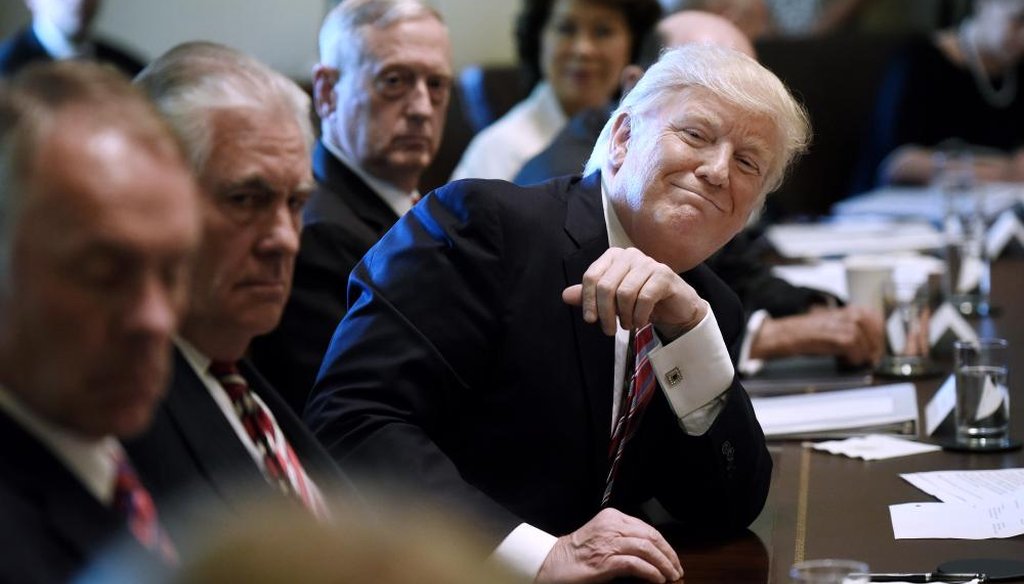Stand up for the facts!
Our only agenda is to publish the truth so you can be an informed participant in democracy.
We need your help.
I would like to contribute

Preisdent Donald Trump attends a meeting in the Cabinet Room of the White House June 12, 2017, in Washington. (Getty)
Here's a quick test: Think about how Donald Trump announced he was running for president. Now, do the same for Hillary Clinton.
I think most of you probably got one but not the other. We remember Trump and his wife Melania gliding down the Trump Tower escalator in June 2015. And we remember some of the things Trump said that day.
"When Mexico sends its people, they're not sending their best. They're not sending you. They're not sending you," Trump said. "They're sending people that have lots of problems, and they're bringing those problems with us. They're bringing drugs. They're bringing crime. They're rapists. And some, I assume, are good people."
As for Clinton?
Some of you, I'd guess, might remember her first major campaign rally, also in June 2015, also in New York. But that wasn't the announcement that she was running for president. That came a few months earlier, in a two-minute, 15-second video.
I bring this up (thanks for playing, by the way) because it's a perfect anecdote of how life for fact-checkers has changed in the era of Trump. Unlike Trump, Clinton carefully scripted and timed her announcement. Just like a typical politician we've seen hundreds of times. And it was free of statements that could be fact-checked. Trump, on the other hand, spoke for 40 minutes, and at least some of what he said wasn't from any script. Fact-checkers at PolitiFact analyzed five claims Trump made during that first speech. Those ratings? False, Pants on Fire, False, Mostly False and False.
So yes, fact-checking Trump is different on some levels. We must be quicker and more decisive, we have to be smarter about what facts we choose to pursue, and we have to be prepared for intense criticism. Trump, in a speech before the election, referred to fact-checkers as "scum."
But in other ways, not much has changed. Fact-checking — and PolitiFact in particular — was built upon an idea that people want to hold their politicians accountable for the claims they make. And in a world with lots of misinformation, readers, viewers, and voters are looking for places that can quickly sort facts from falsehoods.
Maybe those cries are just a bit louder today.
At the height of the 2016 campaign, PolitiFact.com saw more monthly visitors than disney.com, nfl.com, or potterybarn.com, according to data kept by Quantcast. So as I tell people, we were more popular than Mickey Mouse, Tom Brady and stylish dining ware. Okay, don't fact-check me on that.
Seriously, though, PolitiFact's web traffic for 2016 more than doubled compared to 2015 (54 million page views to nearly 115 million page views). And so far in 2017, we're ahead of where we were last year, when people were voting.
Those numbers are huge for us but still relatively small when compared with national media. But it's important to note that PolitiFact, on an average month, might publish 150 articles. The Washington Post has said it posts 1,200 pieces of content per day. We're doing more with fewer opportunities, and readers are reacting.
I love citing a survey done of NPR listeners, originally shared with me by Alexios Mantzarlis, director of the still-young International Fact-Checking Network. The survey asked respondents what political stories they wanted to be covered.
The top result was the actual results of the election. The second was fact-checking of candidates' statements, with 77 percent of respondents very interested in seeing that covered. On the other end? Less than 13 percent of respondents said they were very interested in stories about polling and fundraising.
That's quite a change from where we started.
Bill Adair, who created PolitiFact in 2007, tells a story about how people couldn't pronounce our name or how difficult it was to get a call back. One of our first writers, Robert Farley (who now works at Factcheck.org), had to explain his job as a fact-checker to an old boss.
What do you do? the old boss would ask.
I fact-check claims made by politicians, Rob would say back.
But that would take like 10 minutes. What do you do after that? the editor would ask again, like he was trying to understand a new mathematical concept.
Today, PolitiFact has published more than 14,000 fact-checks on our Truth-O-Meter. We have healthy competition from the Washington Post and Factcheck.org. The New York Times hired their first full-time fact-checker in February, a former PolitiFact writer.
Across the world, there are now full-time fact-checking operations in 47 countries with 114 fact-checking organizations, according to a census by the Duke Reporters' Lab. That's a 159 percent increase since 2014.
Think fact-checking can't change minds? Researchers recently presented participants four Trump falsehoods and asked people to say whether they believed them. After demonstrating with credible sources that Trump's claims were false, belief in them fell among all groups, including Trump supporters.
Think this is reading like promotional material for starting more fact-checking outlets and incorporating them into more newsrooms? Guilty.
Journalists sit down in newsrooms every day and discuss the best way to tell a story. Maybe it's through a video, or a Q&A, or a narrative. Those conversations should also include when it's appropriate to tell a story through a fact-check.
Trump certainly has highlighted the importance of independent fact-checking (we at PolitiFact fact-checked him 313 times during the campaign, and 51 percent of the claims we analyzed rated False or Pants on Fire). But the need started before Trump, and it extends through Congress to state capitols and city halls.
Here's an important point: You need to have thick skin.
Fact-checking is a little like being the referee between bitter rivals, and not many people root for the referee. Make no mistake, politicians on the right and the left would be happy if fact-checking as a format went belly up. Hyper-partisans who see the world in black and white, right and wrong, would be as pleased.
But when those calls and emails and tweets come — and they do — we remember that we serve the readers.
And they're reading.
Our Sources
Linked in the story.




























